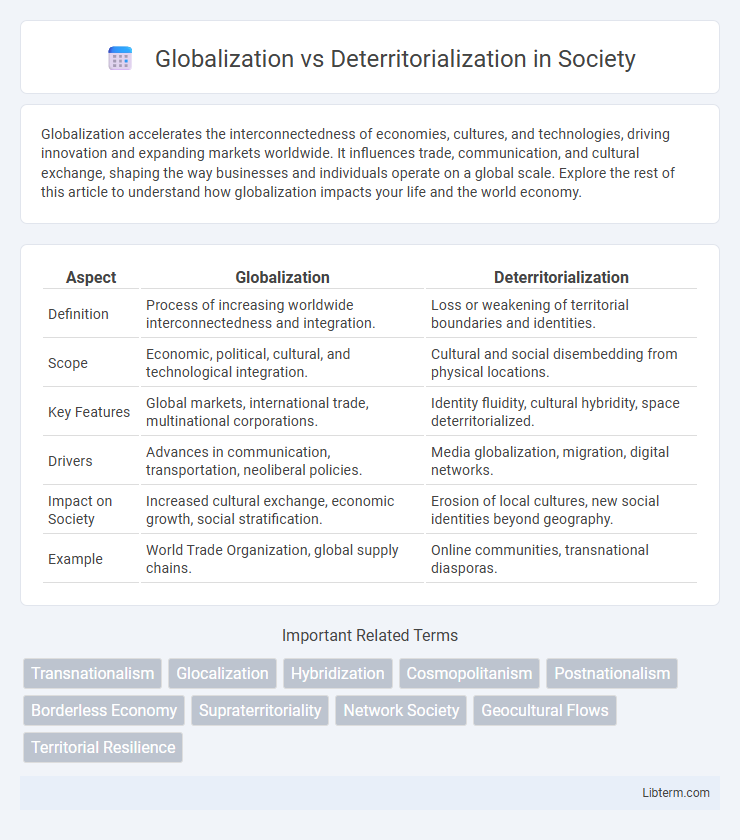Globalization accelerates the interconnectedness of economies, cultures, and technologies, driving innovation and expanding markets worldwide. It influences trade, communication, and cultural exchange, shaping the way businesses and individuals operate on a global scale. Explore the rest of this article to understand how globalization impacts your life and the world economy.
Table of Comparison
| Aspect | Globalization | Deterritorialization |
|---|---|---|
| Definition | Process of increasing worldwide interconnectedness and integration. | Loss or weakening of territorial boundaries and identities. |
| Scope | Economic, political, cultural, and technological integration. | Cultural and social disembedding from physical locations. |
| Key Features | Global markets, international trade, multinational corporations. | Identity fluidity, cultural hybridity, space deterritorialized. |
| Drivers | Advances in communication, transportation, neoliberal policies. | Media globalization, migration, digital networks. |
| Impact on Society | Increased cultural exchange, economic growth, social stratification. | Erosion of local cultures, new social identities beyond geography. |
| Example | World Trade Organization, global supply chains. | Online communities, transnational diasporas. |
Introduction to Globalization and Deterritorialization
Globalization refers to the increasing interconnectedness of economies, cultures, and populations driven by trade, communication, and technology, transcending geographical boundaries. Deterritorialization involves the process by which social, cultural, and economic activities become independent of geographic locations, reshaping traditional notions of space and identity. Both concepts highlight the shift from localized experiences to global and networked realities, emphasizing changes in spatial and cultural dynamics.
Defining Globalization: Key Concepts and Characteristics
Globalization encompasses the increasing interconnectedness of economies, cultures, and populations driven by trade, technology, and communication advancements. Key characteristics include the flow of capital, goods, services, information, and cultural exchange across national borders, leading to economic integration and cultural hybridization. The process reshapes local identities while fostering global networks, contrasting with deterritorialization, which emphasizes the weakening of geographical and political boundaries in social and cultural contexts.
Understanding Deterritorialization: Meaning and Implications
Deterritorialization refers to the process by which social, cultural, and economic activities transcend geographical boundaries, weakening the traditional link between identity and territory. This concept highlights the increasing influence of digital communication, global media, and transnational flows that reshape how communities form and interact beyond physical spaces. Understanding deterritorialization reveals its implications for sovereignty, cultural identity, and economic regulation in an interconnected world.
Historical Evolution of Globalization and Deterritorialization
The historical evolution of globalization traces back to ancient trade routes like the Silk Road, expanding dramatically during the Age of Exploration and accelerating with the Industrial Revolution, which enabled mass production and global exchange. Deterritorialization, emerging prominently in late 20th-century globalization theory, refers to the diminishing influence of geographical boundaries on social, political, and economic interactions due to advances in technology, communication, and transnational flows. The interplay between globalization and deterritorialization highlights a shift from territorially anchored nation-states to increasingly interconnected and border-transcending global networks.
The Interplay Between Globalization and Deterritorialization
Globalization accelerates the flow of goods, information, and culture across borders, fostering economic integration and cultural exchange, while deterritorialization challenges traditional spatial and national boundaries by emphasizing the decoupling of social, political, and economic processes from specific geographic locations. The interplay between globalization and deterritorialization reshapes identities, governance, and economic practices by enabling transnational networks and hybrid cultural forms that transcend territorial constraints. This dynamic interaction drives the transformation of global social structures, prompting new forms of connectivity and redefined notions of place and belonging.
Economic Impact: Market Integration vs Borderless Exchanges
Globalization drives economic impact through market integration, enabling multinational corporations to expand supply chains and access diverse consumer bases, thereby increasing trade volumes and investment flows. Deterritorialization fosters borderless exchanges by leveraging digital platforms and blockchain technology, facilitating seamless cross-border transactions and reducing reliance on traditional physical locations. Both phenomena transform global economies by reshaping trade patterns, promoting financial interconnectedness, and enhancing the speed and efficiency of economic exchanges.
Cultural Transformation: Homogenization or Hybridization?
Globalization drives cultural transformation through processes of homogenization, where dominant cultures spread globally, leading to uniform cultural expressions and the erosion of local identities. Deterritorialization, however, emphasizes hybridization by facilitating the mixing of cultural elements beyond geographic boundaries, creating new, syncretic cultural forms that reshape traditional identities. The tension between homogenization and hybridization highlights contrasting impacts of global interconnectedness on cultural diversity and localization.
Political Dynamics: Sovereignty in a Deterritorialized World
Political dynamics in a deterritorialized world challenge traditional notions of sovereignty, as state power becomes increasingly diffused across transnational networks and supranational institutions. Globalization enables the flow of capital, information, and people beyond borders, eroding the monopoly states once held over governance and control. This shift compels states to negotiate authority with non-state actors, reshaping sovereignty into a more complex, layered concept rather than a fixed territorial domain.
Case Studies: Real-World Examples of Deterritorialization
Deterritorialization manifests in diverse real-world contexts such as digital nomadism, where individuals detach from specific geographic locations while maintaining global connectivity via technology. The rise of multinational corporations exemplifies deterritorialization by reorganizing production and operations beyond national borders to optimize resources and markets. Transnational social movements also illustrate this phenomenon by mobilizing collective identities and political agendas that transcend traditional territorial boundaries.
Future Trends: The Path Forward for Globalization and Deterritorialization
Future trends in globalization highlight increased digital integration and cross-border data flows, enhancing economic interdependence without geographical constraints. Deterritorialization accelerates through virtual workspaces and decentralized networks, reducing reliance on physical locations and fostering global cultural exchange. Advancements in AI and blockchain technology promise to further dissolve traditional territorial boundaries, creating adaptive and resilient global systems.
Globalization Infographic

 libterm.com
libterm.com